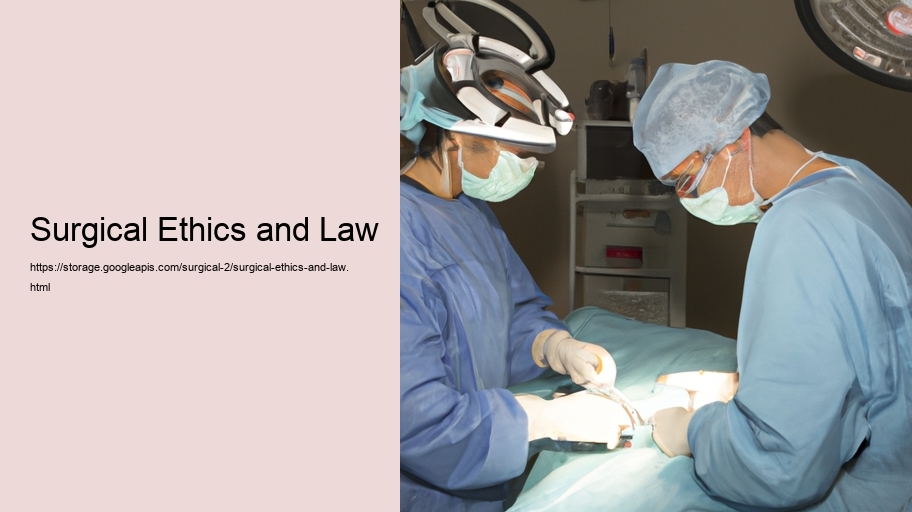Surgical Ethics and Law: Navigating the Complexities of Modern Medicine
The practice of surgery has always been more than the mere application of medical knowledge and technical skill. It is a complex interaction between the patient's needs, society's expectations, and the surgeon's expertise. In this crucible, two guiding forces shape the surgeon's actions: ethics and law. These two domains, while distinct, are deeply intertwined and play a pivotal role in the governance of surgical practice. This essay explores the contours of surgical ethics and law, highlighting their importance and the challenges they present in our ever-evolving healthcare landscape.
Ethics in surgery is a branch of medical ethics that deals specifically with the moral principles and values governing surgeons' conduct. It encompasses a wide range of issues from informed consent to end-of-life decisions, the allocation of scarce resources, and the management of surgical innovation and research. At the core of surgical ethics are four fundamental principles: autonomy, beneficence, non-maleficence, and justice.
Autonomy respects the patient's right to make informed decisions about their own body and treatment. In the surgical context, this means that patients must be given adequate information about their condition, the proposed intervention, its risks and benefits, and any reasonable alternatives, including the option of no treatment. This informed consent process is not merely a legal formality but a fundamental ethical obligation that recognizes the patient as an individual with their own values and goals.
Beneficence and non-maleficence are closely related principles that dictate the surgeon's obligation to act in the patient's best interest (beneficence) and to do no harm (non-maleficence). These principles often require a delicate balance, particularly in surgery where the very act of intervention carries inherent risks. Surgeons must weigh these risks against the potential benefits, always striving to maximize the latter and minimize the former.
Justice in surgery requires that surgeons and the healthcare system at large distribute resources and care without prejudice, providing equal treatment to all patients. This includes fair access to surgical interventions, the equitable allocation of donor organs, and the unbiased consideration of patients for experimental procedures or clinical trials.
Navigating these ethical principles becomes increasingly challenging as technology advances and healthcare systems become more complex. Issues such as the ethics of robotic surgery, the use of artificial intelligence in surgical decision-making, and the management of genetic information pose new questions that the field of surgical ethics must address.
Parallel to the ethical considerations are the legal frameworks that govern surgical practice. Law in surgery involves the application of healthcare law, malpractice statutes, and regulatory compliance to the surgical profession. Legal standards provide a baseline for acceptable practice, protecting patients from negligent care and providing a means of recourse when standards are not met.
The legal concept of the standard of care is central to surgical practice. This standard is defined by the care that a reasonably competent surgeon would provide in similar circumstances. It serves as a benchmark against which actual surgical care is measured. When surgeons fail to meet this standard, they may be liable for malpractice, a legal fault that can have severe consequences for both the patient and the surgeon.
Ethical and legal issues often converge in the surgical realm. For example, a surgeon's ethical duty to disclose all material risks of a procedure is also a legal requirement under the doctrine of informed consent. Failure to obtain proper informed consent can result in both ethical censure and legal liability.
Yet, the relationship between ethics and law is not always harmonious. At times, legal regulations may seem at odds with ethical imperatives, such as when laws limit a patient's autonomy in decision-making or when legal risks discourage surgeons from pursuing innovative but potentially life-saving procedures.
In conclusion, surgical ethics and law are essential pillars that support the integrity of the surgical profession. They provide the framework within which surgeons must operate, ensuring that patient welfare remains at the heart of all surgical endeavors. As medicine continues to evolve, so too must our understanding of these principles, ensuring they adapt to meet the challenges of modern healthcare. It is only through a continued commitment to ethical reflection and legal accountability that surgery can maintain its honored place in the service of human health.
